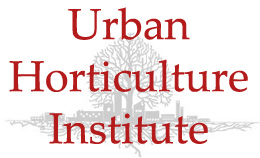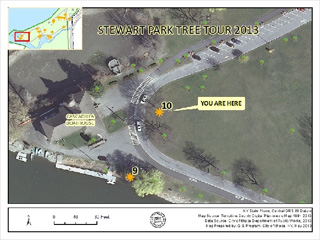Back to tree list
City of Ithaca
Stewart Park Tree Tour
Thornless Honey Locust
Gleditsia triacanthos var. inermis
If there are leaves on the tree, look up and notice the tiny size of the leaflets. The honeylocust has compound leaves—that is each leaf is made up of many smaller leaflets. Some of the leaves of a honeylocust are pinnately compound (a single stalk, called a rachis, connecting the leaflets) and some of them, especially if the tree is young, are bi-pinnately compound, which looks like a tree in miniature, there are so many leaflets. The area under the tree has dappled light, thanks to the thousands of leaflets diffusing sunlight.
Honeylocust trees in the wild have thorns, but those in cultivation are typically thornless. Native to the Midwest, the trees are fast growers, and can grow to 40-70’ in height. Their leaves are a bright green and turn clear yellow in the fall. If you don’t like raking leaves, the honeylocust might be for you, as they drop their leaves early and the tiny leaflets tend to disappear in the grass or garden bed.
Many cities use honeylocust trees extensively along the city streets—they are tough trees and tolerant of many growing conditions common to urban areas: high pH soils, deicing salts, and compaction. Take a close look at the honeylocust tree growing in the parking lot of Shortstop Deli—it has virtually no access to open soil, yet it appears to be thriving.
Honeylocust trees are so named because the Native Americans ground up the seeds, a legume, into a sweet-tasting concoction. The native tree is sometimes called the Confederate Pintree, as Confederate soldiers used the thorns to pin their uniforms together.
This tree was cored to document its growth rate for the last 25 years. The tree has averaged ¼ to 1/3 of an inch growth for each annual ring. That means the tree’s trunk increases over a half inch each year!
~contributed by Barb Neal
More info, images at the Woody Plants Database website.
Back to tree listFor more information about Ithaca City Trees, contact City Forester Jeanne Grace: jgrace@cityofithaca.org (607) 272-1718.

